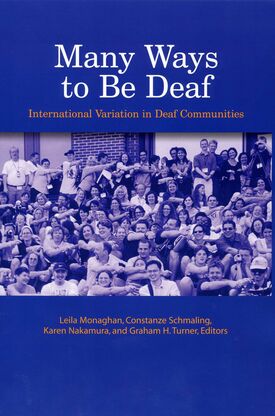
Many Ways to Be Deaf
International Variation in Deaf Communities
First Edition
Description
The recent explosion of sociocultural, linguistic, and historical research on signed languages throughout the world has culminated in Many Ways to Be Deaf, an unmatched collection of in-depth articles about linguistic diversity in Deaf communities on five continents. Twenty-four international scholars have contributed their findings from studying Deaf communities in Japan, Thailand, Viet Nam, Taiwan, Russia, Sweden, Austria, Switzerland, Great Britain, Ireland, Nigeria, South Africa, Brazil, Nicaragua, and the United States. Sixteen chapters consider the various antecedents of each country’s native signed language, taking into account the historical background of their development and also the effects of foreign influences and changes in philosophies by the larger, dominant hearing societies. The remarkable range of topics covered in Many Ways to Be Deaf will fascinate readers, from the evolution of British fingerspelling traced back to the 17th century; the comparison of Swiss German Sign Language with Rhaeto-Romansch, another Swiss minority language; the analysis of seven signed languages described in Thailand and how they differ in relation to their distance from isolated Deaf communities to Bangkok and other urban centers; to the vaulting development of a nascent sign language in Nicaragua, and much more. The diversity of background and training among the contributors to Many Ways to Be Deaf distinguishes it as a genuine and unique multicultural examination of the myriad manifestations of being Deaf in a diverse world.
Leila Monaghan is Lecturer in the Department of Communication and Culture at Indiana University, Bloomington, IN. Constanze Schmaling is a linguist at the Institute of German Sign Language at Hamburg University, Germany. Karen Nakamura, an anthropologist, teaches at Macalester College in St. Paul, MN. Graham H. Turner is Senior Lecturer in the Deaf Studies program at the University of Central Lancashire, Great Britain.
Reviews
"Many Ways to Be Deaf is highly recommended for those with interests in anthropology, sociology, signed languages, deaf culture, language politics and/or comparative education."
— Sally Y. Nhomi, Review of Disability Studies
"Interestingly, the chapter on the Brazilian Deaf Community has a paragraph that contains probably one of the best pieces of advice for advocating acceptance of Sign Language and Deaf Culture, which I have yet to find anywhere else. The author, Norine Berenz, summarizes what Ella Lentz, a Deaf American poet, actor, and educator, said: that acceptance can be achieved through artistic means such as National Theater of the Deaf in the United States, rather than official circles, because this would be an opportunity for the general public to learn and realize 'the eloquence and sophistication possible in signed discourse' (p. 175)."
— Stephen F. Weiner, Gallaudet University, Disability Studies Quarterly